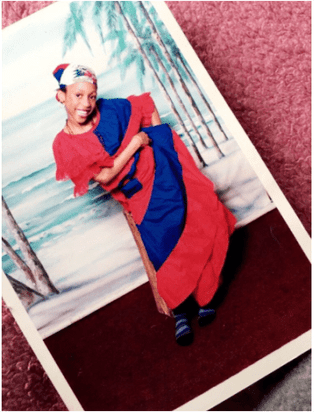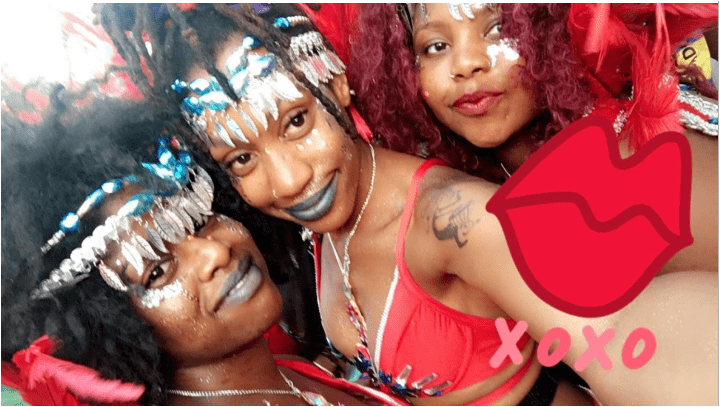|
OVERTURE...With all that is happening in the world — the pending election of either evil or evil-er to the United States presidency, the ever-present process of gentrification in my own backyard, the slandering of Black women’s edges while they slay gold-medal rankings at the Olympics and my own personal struggles (e.g. to find proper hair moisturizer for my locs) — I feel almost guilty writing a piece whose purpose is neither to critique nor evaluate nor call to protest. SIKE. The goal of this piece is to simply reflect and that is important. I have no guilt about that. I am reflecting on those brief moments in time, this year, where I have had the opportunity to, or rather where I remembered to, love myself and care for my ‘moment’ enough to be unapologetic about my existence in a time and space that continuously lets me know that it could give less than 5 gourde about my body, mind, and spirit. In 2016, I do not know any better way to reflect than by looking through the ultimate archive, the archive of archives…social media. What I have complied below are a handful of captions and comments from this year that describe the ideas and discussions important to me. They are oriented towards three topics:
 Haitian Flag Day Performance at The Caton School, P.S. 249, Brooklyn, NY; Circa 2000. Haitian Flag Day Performance at The Caton School, P.S. 249, Brooklyn, NY; Circa 2000. I am a dancer. I always have been. My preferred style of dance is that which comes from Haiti. With it, I use the history I inherited to combat and recover from the traumas of today. Many choose this dance vocabulary to do exactly the same thing despite, perhaps, the fact that they are not of Haitian descent. Titled “Afro-Haitian,” “Haitian,” or “Afro-Caribbean” dance, dance professionals use this dance vocabulary to facilitate the growth of their students as healthy people and as advocates of Black pleasure! Often times, though, we can get lost in the nuance of how we describe what we are doing and that then results in a sort of cut-and-paste version of pleasure, which does nothing for us. On April 1, 2016, this very discussion was brought to my attention by a colleague of mine, drummer Morgan Zwerlein of Troupe Makandal and student of late Master drummer Frisner Augustin. On that day, as I furiously tapped my phone’s keys to express my dismay regarding the tendency of many to shelf difference in order create unity and oneness, I learned that there is value understanding why that tendency might exist. The result of my tapping is the following: The discussion is complex and you are right to bring it to light. However, it’s more than the political notion of this dance/music as being African. Haitian dance/music is rooted in Vodou. Vodou, though derived from Africa, through the result of the physical, spiritual, and emotional displacement of people from their home countries, communities, and languages, is Haitian. That particular mix is Haitian. For those who live by its doctrine, struggle, etc., the prefix “afro” is useless because it, in some ways, detracts from what the dance/music is supposed to be. But let’s be clear: the many teachers who choose to use this term are not necessarily at a loss for proper understanding of what Vodou is and what it represents for the people. They simply make a distinction between their use of the dance/music to communicate and teach, and, the very real tangible spirituality that it is for its people and practitioners. [In my opinion] the title “afro” allows them to do this, as well as explain their own diverse backgrounds and the fact that they do, sometimes, create a melange between traditional Haitian dance/music and other west African/African dance/movement. That melange is what characterizes the difference between folklore and Vodou (tradition). The fact that I even had the opportunity to engage in such discussion was exciting me. Social media, despite its negatives, allowed for both me and my colleague to productively debate with a complete stranger. Certainly, the mass of Black men, women, and youth advocating for Black lives and issues is beautiful! My spirit soars when I peep the slay-age on my news feed, on TV, in the news, and of course in person. Let it be known, though, that substance is still important here and that quantity cannot win the battle on its own. Know your stuff. Consider multiple approaches and perspectives before becoming settled into the opinion, belief, or theory that is most true to you. You run the risk of being empty, and, when done on the large-scale, cultish. To effectively summarize, I use a meme posted on April 29, 2016: A lot of “woke” people have this superiority complex and it’s so ironic. You’ve freed your mind only to become a slave to your own ego. I would imagine that it is no-one's goal to become a slave to your ego and so perhaps we might discuss how that even develops as an issue. Sure, being an informed individual is a part of becoming “woke,” but, the superiority complex? I believe that there is something to be said about community. We do not become “woke” to only liberate the self; we do so for our social networks too — our families, our friends, our children, and…our community. Nevertheless, we use the latter term so often, that at times it seems as if it has no meaning, despite how powerful the word actually is. DEFINE IT. ALWAYS. Make sure you know who constitutes your community as it is the only tool you have to remain grounded when things being to go awry. On June 1, 2016, as I began to learn a little more about who was apart of my community, I wrote: It's amidst the most ridiculous kind of chaos that you learn the true shape of your support group, so I pray everyday for the people I have by my side. I also, however, proudly bare the burden that comes with being a solid foundation for another despite the trembling of my legs. I am strengthened and blessed. Miss me with the headache. Signed, Management.  (Left to right) Veroneque Ignace and Dextina Booker at Le Boucanier Beach Resort in Leogane, Haiti. (Left to right) Veroneque Ignace and Dextina Booker at Le Boucanier Beach Resort in Leogane, Haiti. I wrote this while traveling in Haiti to handle the affairs of my late father. I was faced with an overwhelming amount of stress and betrayal resulting from ongoing family disputes, regarding more things than I can count on both my hands. Instead of grieving, I was expected to be the stage upon which everyone could stand and scream and cry. Those who I believed I could lean on, let me know that all along the distance between us was simply too far for me rest my weight upon their shoulders. This was definitely a moment of pure turmoil in my life if ever I’d experienced it. It wasn't until July 16, 2016 that I learned, from a meme, that: We mature with damage, not with the years. Dextina Booker, otherwise known to social media as KingDextina, is one of my closest friends and she chose to visit me in Haiti as I was battling my family for the opportunity to at least shed one tear over the death of my father. She shared a piece of wisdom so delicate that it may stand without my qualifying it. On that same July 16, 2016, she wrote: It is not your job to convince anyone to love you for any reason. Loving yourself enough to know that is one of the hardest things to do. I had a decision to make — either love myself enough to make those tough decisions about who gets to be in my community or spend time convincing toxic people that they should love me just as much as my papa did. If you’ve been paying attention thus far, you know what I decided. #YouCan’tSitWithUs✌🏾️. Moving away from my family, the comment above by Booker reminds me of a meme I saw on July 30th, 2016. It said: Nigglations 4:13, Thou shall not checketh for a nigga that ain’t checking for thee. The meme is certainly a simplification of what Booker is actually saying, in that, it specifies the circumstance within which you are loving yourself. Aside from the arguably controversial terminology, the raw structure and use of language makes this meme quote celebratory. Sometimes we must move beyond our limitations to accurately and precisely feel love as the very thing that you give to yourself. This is applicable universally. You must love yourself in order to define it and then share that with another. You must know what it feels like at its best, and, the only way to begin that process is to make yourself a priority in your own life. For me, making myself a priority means understanding that there are things I can do for myself that actually move behind the confines of my mind and body. For example, allowing myself to be creative results in healing for me and all those who see me move. On July 31, 2016, my sister, Sgvianel Suffren, posted a picture of me on Instagram with the quote: "Sometimes you've got to let everything go—purge yourself...If you are unhappy with anything...whatever is bringing you down, get rid of it. Because you'll find that when you're free, your true creativity, your true self comes out." -Tina Turner I think both Turner and my sister would agree with me when I say that when you embrace the platform you stand on, you make your healing process so much more fulfilling. When you celebrate your past in the present, you make way for a future that celebrates your life and trajectory orgasmically. On August 13, 2016, the day of Brooklyn’s annual celebration of the now 225 year old ceremony which launched the Haitian Revolution, I wrote: Amidst the current state of affairs, perhaps our own dissonance, and the journey through life in systems built antalgically, we are still drawn to create spaces for community togetherness and healing, using the tools our ancestors imprinted upon us. (Inherited) [n]ostalgia becomes more than memory, then. It becomes and is that which defines and, in Resist. Restore. language, generates a spirit of embodied resistance. Although, “antalgically” is not a word, I used it in that post because the term antalgic means against pain. And, though used as a medical descriptor, like in the phrase ‘antalgic gait’ meaning walking against pain, it is suitable to describe the institutions set up to perpetuate the attack on Black bodies, Black wombs, Black happiness, and Black faces in the future. That being said, when we consider our longstanding journey of embodying resistance, and especially what that journey looks like for Black women, we should never hesitate to rejoice. We are utterly and un-regrettably serious when we say #BlackGirlMagic, #BlackWomenDidThat, and, on August 14, 2016, that: Being a black girl right now is like being a part of some super exclusive, prestigious goddess organization. It’s lit. All this in mind, reflecting on these hand selected captions and comments is what allows me to then resist, restore, and reclaim my magic. My scholarly and choreographic work is the space where I continuously do that and it uses this background to discuss and develop change in my communities.
I have learned that the Black body is a repository for movement as confirmed by the tradition, religion, music, and dance of Africa and the diaspora still performed and practiced today. I have learned that my own movement codifies a history and language which I have inherited and hope to create. Personally, I believe that creativity, motivated by love for thyself, is necessary for survival as it is informed by experiential living. Channeling the cultures, traditions, and even the disputes of my family is what solidifies my Haitian identity and allows me a true understanding of the pains of trauma and the relief of recovery. It goes without saying that the work I am most passionate about is that which allows me to embrace myself, my community, and my art. This should be what we all strive for.
1 Comment
3/29/2018 08:40:51 am
Thanks for sharing all the superb post its really helpful for me. the quality of content will be unique. keep it up you are doing a good job
Reply
Leave a Reply. |
The BlogSak Rete Ou? (What's Stopping You? in Haitian Creole), holds space for reflections, meditations, poetry, video blogs, and capacity to captivate readers through creative writing. To the question, sak rete ou?, we respond "Nou Se Kriyol!" (We are the Children! in Haitian Creole), implying and calling on the strength, kindness, and revolution of our Haitian ancestors to move forward! Archives
September 2020
Categories |

 RSS Feed
RSS Feed